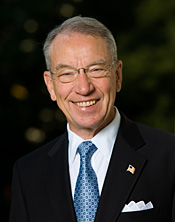
From food stamps to student loans, federal lawmakers must balance the interests of the taxpaying public with the interests of the public good. It’s part of the constitutional job description. As keepers of the public purse, members of Congress make tax and spending decisions that determine from whom revenue is raised and how those tax dollars are spent. Working under a cloud of a $17 trillion national debt, it’s obvious that Washington can’t tax-and-spend its way to prosperity.
Just as importantly, public money spent on medical research, nutrition, defense, food safety or education requires careful scrutiny to protect the integrity of hard-earned tax dollars and to ensure those dollars are used as effectively and efficiently as possible. Every dollar lost to fraud, waste or abuse rips off the taxpaying public and squeezes limited resources for public services.
Congress this summer has debated policy decisions that will set interest rates on new federal student loans. Although policymakers share a common goal to keep higher education attainable for the next generation, it proved more difficult to reach a consensus on how to pay for that goal. Most public discussion focused on the 3.4 percent rate on certain need-based loans, which has expired. However, most student loan borrowers did not qualify for that interest rate in the first place. Don’t forget, the Senate Majority Leader allowed the special rate to expire, despite the fact that the House of Representatives had passed legislation. There also was bipartisan agreement on a long-term plan modeled on President Obama’s proposal. That agreement would let all borrowers to qualify for lower rates set by the market when the economy is struggling without holding interest rates artificially low when the economy is good. Finally, such a plan was allowed a Senate vote and passed. Let’s be clear. The plan that finally passed the U.S. Senate will provide more students more savings than simply extending the special rate for another year or two. The agreement serves as a rare example in recent years of sensible bipartisanship winning the day.
That’s good news for students who will be able to lock in currently low interest rates for the life of their loans before heading off to campus. But more needs to be done to address rising tuition costs and college affordability.
In addition to federal spending, Congress uses the tax code to help shape public policy, including health care and higher education. For example, by extending tax-exempt status to charitable organizations and institutions that serve a public benefit, less revenue is raised in exchange.
It’s important to examine the federal budget and federal tax code to ensure the spending and revenue sides of the ledger comply with the law as intended.
That’s why I’ve put the nation’s tax-exempt sector — including colleges and hospitals — under the congressional microscope to ensure these tax-advantaged organizations are upholding their end of the bargain with the taxpaying public.
Most recently, my non-profit oversight work has led me to conduct an inquiry of New York University and its compensation practices. During confirmation hearings earlier this year for Treasury Secretary Jacob J. Lew, it was revealed that while he was executive vice president at NYU, he received subsidized mortgages and upon leaving NYU received a $685,000 bonus.
To compare, NYU could have funded about 15 full-ride scholarships to its undergraduate College of Arts and Sciences in lieu of Mr. Lew’s parting bonus. After I inquired about other loans extended to additional faculty members, the university has so far dragged its feet to fully comply with my investigation regarding its executive compensation policies.
My oversight work often isn’t met with open arms. However, it can make a difference.
In 2008 I wrote to 136 colleges sitting on at least $500 million apiece in tax-free endowments to inquire about their annual payouts and student aid packages. Not long after I raised questions about double-digit returns on tax-advantaged endowments and the paltry payouts by some universities, a handful of Ivy League colleges announced tuition breaks for lower-income students. Coincidence or not, it’s good to see universities that enjoy big tax breaks demonstrate a commitment to offer the best education to more students at the lowest possible cost.
As Congress debates policies aimed at college affordability, I will continue my oversight of NYU to ensure that its tax-advantaged spending complies with its tax-exempt status. Academic executives ought to understand that even the appearance of a sweetheart deal sours the taxpaying public’s appetite for subsidizing college tax breaks just as Congress asks them to continue subsidizing student loans to pay for ever higher tuition. Let’s hope that’s a lesson that tax-exempt universities across the country won’t fail to understand.






